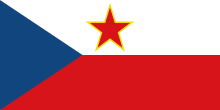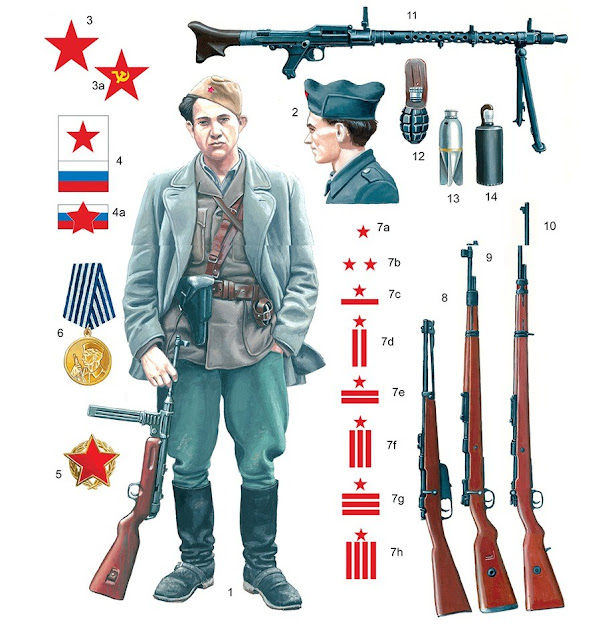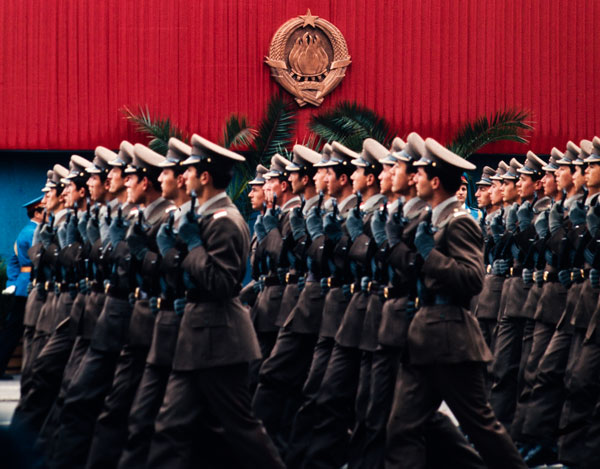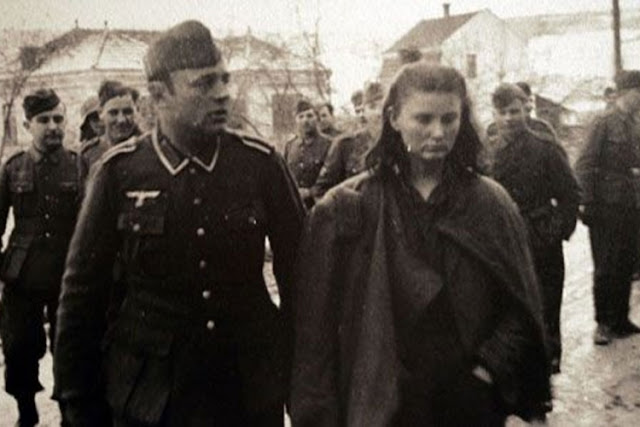First Czechoslovak National Liberation Brigade "Jan Žiška"
 |
| Flag of the Czechoslovak Brigade |
After the collapse of the Kingdom of Yugoslavia in the April war in 1941, most of the Czech and part of the Slovak people found themselves within the borders of the Ustasha Independent State of Croatia. With the establishment of the Independent State of Croatia, the position of the Czechs significantly deteriorated, considering that the Ustashas considered them members of the enemy people.
 |
| Monument to the fallen partisans of the First Czechoslovak Brigade in Jiržice near Miroslava in southern Moravia. |
Unlike the Czechs, the position
of the Slovaks was somewhat better because the Ustashas and the Germans treated
them as members of the allied people. Such treatment, however, did not prevent
the Slovaks from opting for the People's Liberation Struggle. The mass
accession of Czechs and Slovaks to the National Liberation War followed in
1942, which the Ustashas and the Germans could not prevent despite threats and
promises.
 |
| Deputy Commander of the 6th Corps Bogdan Crnobrnja spoke to the fighters of the Czechoslovak Brigade Jan Žiška in 1944. |
On May 3, 1943, the Headquarters
of the III Operational Zone issued an order to form a Czechoslovak operational
unit — the Czechoslovak Battalion. At the time of its founding, in the village
of Cikotama, the battalion numbered 146 fighters whose main task was to act
politically among the Czechs and Slovaks. Until June 17, 1943, the battalion
was under the leadership of the Headquarters of the III Operational Zone, and
since then, as the 4th Battalion, as part of the XVII Brigade. as a unit of the
XVII Brigade he also took part in numerous combat actions. Among them, a
special place is occupied by the march on Banija, which was undertaken by the
XVII Brigade in the period 15-18. VII 1943.
 |
| Review of fighters of the Czechoslovak Brigade, Končanica near Daruvar in 1944. |
After returning from Banija in
August and September 1943, the Battalion, together with other Slavonian units,
performed several more combat tasks and at the same time making preparations for
the formation of the brigade.
The formation of the Brigade was
carried out on October 26, 1943, in the village of Bučje in the presence of
members of the Staff of the VI Corps and the Staff of the XII Division. The
brigade was a triple formation consisting of three battalions (each with three
companies), an escort, a hospital, and a liaison company, as well as a pioneer
platoon.
 |
| Fighters of the Czechoslovak Brigade NOVJ in the Požega Valley in July 1944. |
It operated mainly in Slavonia
and Podravina. In the attack of the 12th Division on Virovitica on 6/7. November,
the brigade secured the direction of Velika Pisanica and Grđevica. Until
mid-December, it carried out diversions on the Virovitica-Našice railway, participated
in the attack on Đakovo on December 14, and in the liberation of Gorjani on
December 17. With one battalion of the Dilj detachment, it invaded Gromačnik
and Sibinj (on the Belgrade-Zagreb line) on 23/24. December, destroyed the
railway in five places and set fire to 98 trucks, 1 locomotive, and 20 wagons.
From January to March 1945, it
carried out a series of smaller actions around Dilj and Papuk, and attacked a
number of enemy strongholds (Trnava, Nabrđe, Bračevac, Donja Motičina, and
others), broke the German column near Stara Subocka in pairs and fought hard,
securing the attack. 12th Division at Vetovo.
 |
| Parade of the Czechoslovak Brigade in Daruvar in 1944. |
The "Jan Žiška" Brigade
was disbanded on April 23, 1945, and its personnel filled the units of the
Fourth Brigade of the 12th Division of the Yugoslav Army.
About 3,000 Czechs and Slovaks
passed through the brigade, of which 298 died during the war.
For war merits, the Brigade was
awarded the Order of Merit for the People with a gold star and the Order of
Brotherhood and Unity with a gold wreath.

Memorial room about Daruvar and the 1st Czechoslovak Brigade of the NOVJ Jan Žižka z Trocnova - Daruvar in World War II
The memory of this unique NOB
brigade lives on today in Daruvar. The city of Daruvar and the Czech Alliance
marks the day of its founding and remember the war journey and the importance of
the brigade.
Source: antifasisticki-vjesnik.org
Wikipedia





Comments
Post a Comment